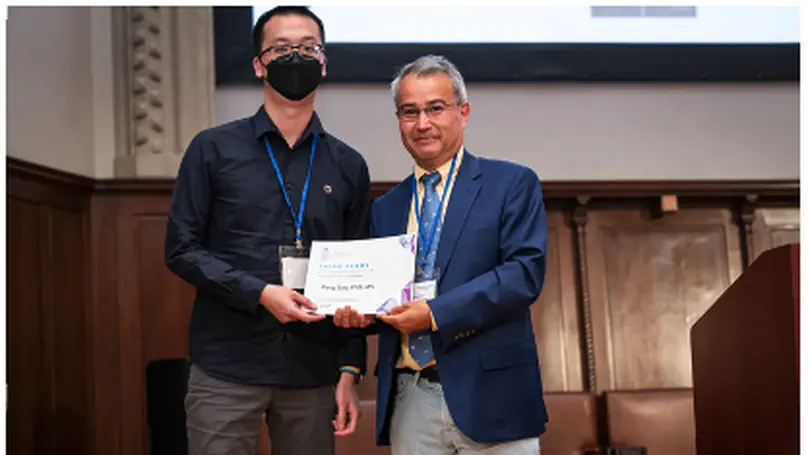Gao
Lab
The Exposomics and Environmental Etiology (E3) Lab is at the the University of Pittsburgh School of Public Health.
The Exposomics and Environmental Etiology (E3) Lab is at the Department of Environmental and Occupational Health at the University of Pittsburgh School of Public Health. We apply mass spectrometry-based targeted and non-targeted analyses to determine the environmental contaminants and xenobiotics in environmental and biological samples. We also utilize next- and third-generation sequencing approaches to investigate the microbiome profiles in these samples. Our long-term goal is to integrate the exposomics with multi-omics profiles and investigate how the exposome impacts human health, as well as better understand the etiology of chronic and idiopathic diseases.
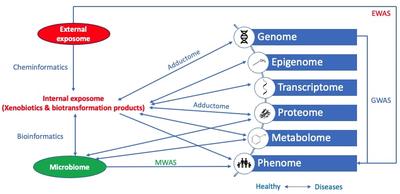
Latest News
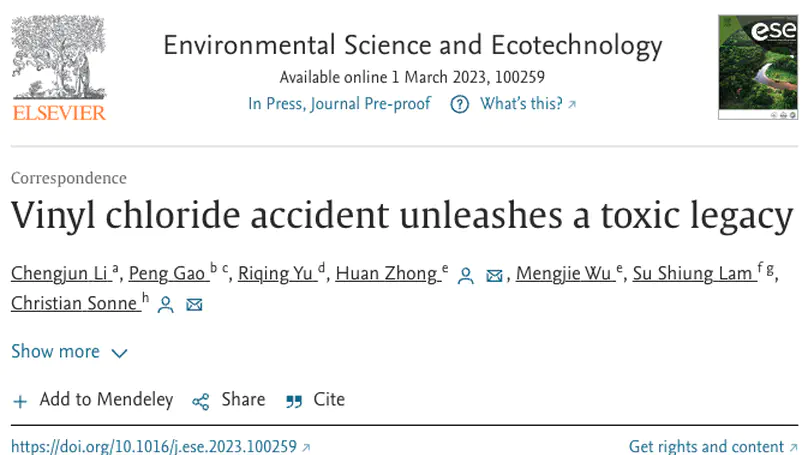
We have published a correspondence paper in Environmental Science and Ecotechnology regarding the vinyl chloride accident in East Palestine from an ecological risk perspective.
More details of the article can be found: https://doi.org/10.1016/j.ese.2023.100259
More information regarding the accident can be found in the following news, panel discussions, and Q&A:
https://www.wtae.com/article/us-epa-considers-future-tests-for-dioxins-in-east-palestine/43052607
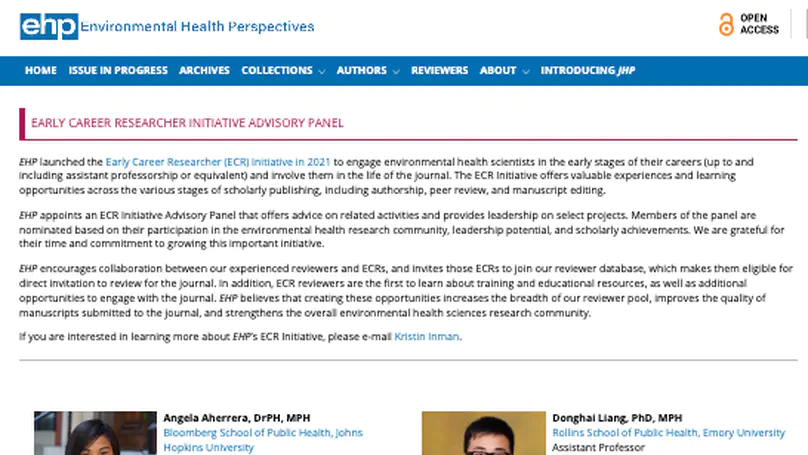
Dr. Gao has been invited to join the Environmental Health Perspectives Early Career Researcher Initiative Advisory Panel.
Environmental Health Perspectives is supported by the National Institute of Environmental Health Sciences and is the leading journal in the field of environmental health sciences.
More details of the panel can be found: https://ehp.niehs.nih.gov/about-ehp/editorial-boards/ECR-advisory-panel
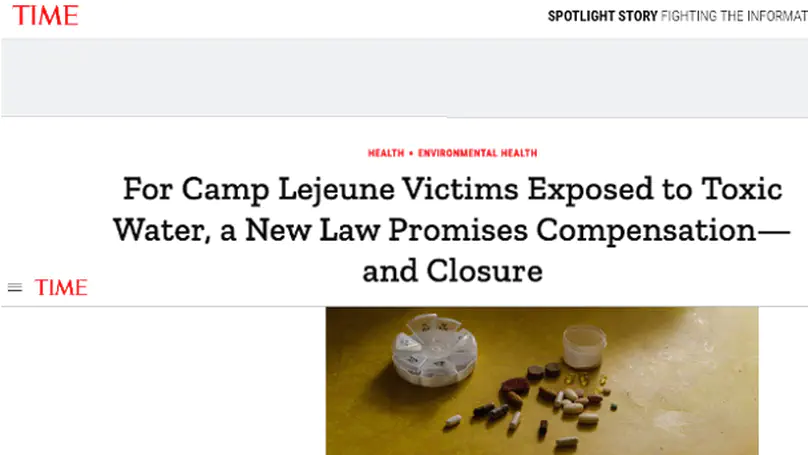
Our Genome Research paper entitled “Precision environmental health monitoring by longitudinal exposome and multi-omics profiling” has been mentioned in a report in Time magazine. Many thanks for the recommendation from Dr. Dolinoy at the University of Michigan School of Public Health!
More details of the press reports of this article can be found: https://time.com/6233757/camp-lejeune-water-justice-act-lawsuits/ https://genome.altmetric.com/details/129356585/news
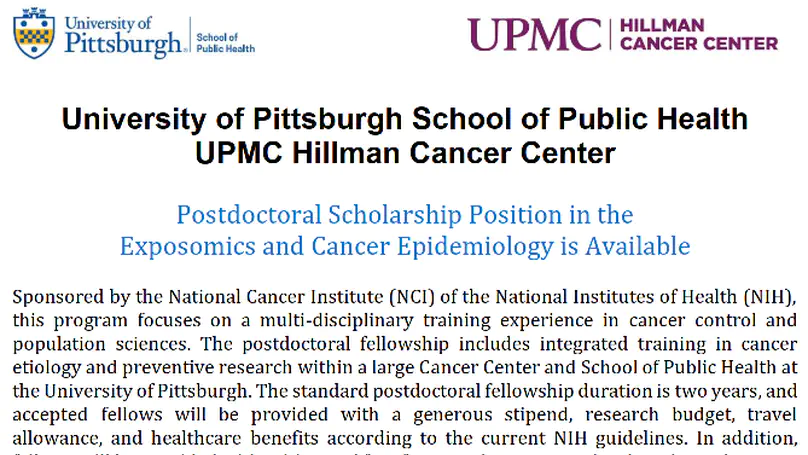
Sponsored by the National Cancer Institute (NCI) of the National Institutes of Health (NIH), this program focuses on a multi-disciplinary training experience in cancer control and population sciences. The postdoctoral fellowship includes integrated training in cancer etiology and preventive research within a large Cancer Center and School of Public Health at the University of Pittsburgh. The standard postdoctoral fellowship duration is two years, and accepted fellows will be provided with a generous stipend, research budget, travel allowance, and healthcare benefits according to the current NIH guidelines. In addition, fellows will be provided with tuition and fees for pursuing a master-level graduate degree at the University of Pittsburgh School of Public Health if desired. This position is renewable after two years depending on the candidate’s performance and funding situation.
This position will work with Dr. Peng Gao from the Department of Environmental and Occupational Health and Dr. Jian-Min Yuan from UPMC Hillman Cancer Center and the Department of Epidemiology on applying the chemical exposomics approach in the discovery and validation of novel risk/protective factors for lung and other cancer types within longitudinal prospective cohort studies. University of Pittsburgh School of Public Health and UPMC Hillman Cancer Center also include multiple disciplinary mentoring teams conducting research from mechanistic experiments and observational studies in populations to randomized intervention studies and testing the efficacy of chemo- and immuno-preventive agents on cancer protection in humans.
The candidate is expected to be familiar with the computational part of -omics (exposomics, metabolomics, and/or proteomics) approaches using high-resolution mass spectrometry. Prior training and experience in non-targeted analysis methods and the use of R or Python are required. Previous experience in the experimental part of using LC/GC-HRMS and targeted analyses are not required but highly desired.
The potential fellow must be a U.S. citizen or permanent resident due to the restriction of the funding mechanism by NIH. A candidate who recently earned a PhD in analytical chemistry, environmental health, bioinformatics, cheminformatics, or other related fields and is interested in cross-disciplinary training and research experience in cancer etiology, prevention, and control is encouraged to apply. Candidates from underrepresented populations are strongly encouraged to apply for this position and will be given the preferences. Please send a cover letter, a most updated CV, and the contact information of references to Dr. Peng Gao, PhD at peg47@pitt.edu and Dr. Jain-Min Yuan, MD, PhD at yuanj@upmc.edu.
